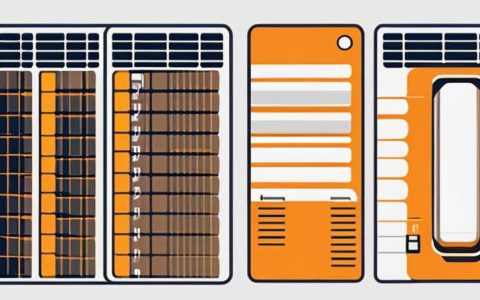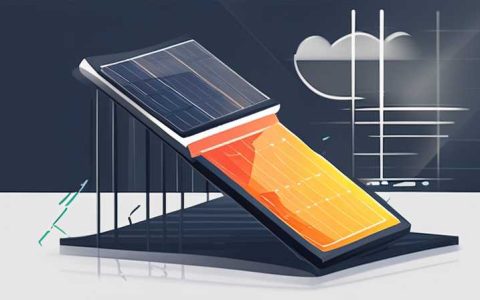
To harness solar energy effectively, understanding the functionality of solar energy batteries is crucial. 1. Solar energy batteries store excess power generated from solar panels for later use, enhancing energy availability and reliability. 2. These batteries help in reducing dependence on the grid, ensuring sustainability and lower electricity bills. 3. Energy storage systems can be utilized during outages, making them essential for modern energy needs. 4. Proper selection, installation, and maintenance of these systems increase their lifespan and efficiency, contributing to a greener lifestyle. The intricacies of utilizing solar energy batteries can maximize the benefits of solar installations while addressing common challenges faced by users.
UNDERSTANDING SOLAR ENERGY BATTERIES
Solar energy batteries serve as storage systems that collect excess energy produced by solar panels. This enables users to use this captured energy during periods of low sunlight or at night. Energy generation fluctuates due to weather and time of day; therefore, adequate storage capacity is vital. By maintaining a balance in energy supply, batteries optimize the overall solar power system’s effectiveness.
The market offers a variety of solar batteries, each designed to meet different energy needs. Lithium-ion batteries, lead-acid batteries, and flow batteries are the most common types. These batteries differentiate themselves in terms of cost, lifespan, performance, and capacity. Users must assess their specific requirements before making a choice, as the right battery can enhance energy efficiency considerably.
SELECTING THE APPROPRIATE BATTERY TYPE
Choosing the right solar energy battery involves an evaluation of several critical factors. Capacity is one of the foremost considerations, measured in kilowatt-hours (kWh). A battery’s capacity defines how much energy it can store, which directly affects how long it can power your home or business. For example, households with higher energy consumption will require larger capacity batteries, while smaller homes could suffice with reduced storage.
Efficiency is another pivotal aspect when it comes to battery selection. It corresponds to how much energy can be retrieved for use versus how much is wasted during the storage process. Higher efficiency batteries enable users to get more out of the energy they store, ultimately leading to increased savings on electricity bills. Choosing an efficient battery minimizes energy losses, maximizing the potential benefits of adopting solar technology.
INSTALLING SOLAR ENERGY BATTERIES
Proper installation of solar energy batteries is paramount for optimum performance. Engaging a certified installer ensures safe and effective setup, adhering to local codes and regulations. Incorrect installation can lead to inadequate performance and potential system failures. An experienced professional will assess your home or facility’s energy needs, making recommendations compatible with your solar power system.
After installation, frequent assessments of the battery’s performance are necessary. Regular maintenance ensures the battery functions correctly and extends its life span. Users should keep a close eye on the state of charge, temperature, and overall health of the batteries. Monitoring tools and software can often assist in tracking battery performance and identifying potential issues before they escalate into costly problems.
MAINTAINING SOLAR ENERGY BATTERIES
To optimize the lifespan and productivity of solar energy batteries, diligent maintenance is essential. Battery maintenance includes monitoring the health of the battery system, checking for any signs of degradation, and ensuring proper ventilation. Adequate air circulation is vital, especially for lead-acid batteries, as they can release harmful gases if not maintained well.
Another integral part of maintenance is ensuring that the batteries are not excessively discharged. Deep cycling can diminish battery life, particularly in lead-acid types; therefore, keeping their charge levels within optimal parameters is critical. Understanding discharge rates and capacity will help users gauge how to utilize the stored energy without jeopardizing the battery’s longevity.
INTEGRATING BATTERIES WITH SOLAR SYSTEMS
The interplay between solar panels and energy storage batteries is crucial to achieving an effective solar power system. In a grid-tied configuration, excess power generated during peak sunlight can charge the battery while the grid serves as a backup during times of low generation. This integration not only enhances reliability but also optimizes energy savings, allowing users to draw upon stored energy instead of paying for electricity during peak hours.
For those opting for off-grid solutions, the relationship between solar panels and storage batteries becomes even more imperative. Comprehensive planning is required to ensure that the solar energy generated meets the daily energy requirements adequately. Users must calculate their energy consumption accurately and adjust their solar panel and battery configuration accordingly. This synergy leads to a sustainable lifestyle with reduced reliance on fossil fuels.
MONITORING AND UPGRADING SYSTEMS
Continuous monitoring and improvement of solar energy systems are advisable for achieving peak performance. Investing in monitoring devices can provide real-time data on battery efficiency, energy generation, and consumption patterns. This information is invaluable in optimizing energy use and planning for potential upgrades.
Upgrading battery systems as technology advances can yield significant benefits. Newer battery technologies often feature improved efficiencies, longer lifespans, and better price points. Users should stay informed about market trends and consider upgrading their systems when beneficial. Additionally, upgrades may involve transitioning to smart technology, which offers convenience and enhances energy regulation and distribution.
ADDRESSING COMMON CHALLENGES
Like any energy system, solar energy batteries may present specific challenges that users need to mitigate. One significant challenge users face is the high initial investment required for solar battery systems. Although long-term savings can offset these costs, obtaining financing or incentives may ease this burden and make solar investments more viable for many.
Another issue users may encounter is the limitations in battery life spans. Most batteries have a finite number of charge cycles before their capacity starts diminishing. Regular assessment is crucial for managing battery life and compressing the costs incurred from replacement. Engaging with manufacturers for guarantees and warranties can further protect investments.
FAQs
WHAT ARE THE BENEFITS OF USING SOLAR ENERGY BATTERIES?
Solar energy batteries offer numerous advantages, including reduced energy costs, independence from the grid, and improved reliability during power outages. By saving excess energy generated by solar panels, these batteries allow users to access power even when sunlight is not abundant. In places where the grid is unreliable, solar batteries provide a dependable energy source, thus enhancing energy security.
Moreover, these storage systems contribute to a sustainable future by promoting the use of renewable energy, minimizing carbon footprints, and allowing for a cleaner environment. When incorporating energy storage, users can balance power loads efficiently, managing demand fluctuations without compromising energy quality. This effective management of renewable energy sources leads to a more resilient energy structure in the long term.
HOW LONG DO SOLAR ENERGY BATTERIES LAST?
The lifespan of solar energy batteries can greatly vary based on the technology used and maintenance practices. Generally, lithium-ion batteries can last around 10-15 years, while traditional lead-acid batteries may only last between 3-7 years. Several factors influence battery longevity, such as environmental conditions, charging habits, and application.
Regular maintenance, such as checking fluid levels in lead-acid batteries and monitoring discharge rates, can significantly extend battery life. Advanced battery systems often feature technologies that ensure optimal charging and discharging cycles, thus improving their lifespan. Users should remain aware of the manufacturer’s guidelines for specific recommendations on maintaining battery health. Appropriating consideration of lifespan can help in planning for potential replacements and budgeting for future energy expenses.
HOW DO I MAINTAIN MY SOLAR ENERGY BATTERIES?
Maintaining solar energy batteries is crucial for ensuring their long-term efficiency and reliability. Routine checks should include monitoring voltage levels, ensuring proper airflow, and maintaining the batteries’ cleanliness. It is essential to inspect for corrosion, particularly in lead-acid batteries, and clean terminals if necessary to prevent performance issues.
Regularly reviewing the battery management system can also help in catching early signs of problems. Ensuring that batteries do not reach deep discharge levels is essential since this can drastically reduce their life expectancy. Following the manufacturer guidelines for maintenance frequency and best practices will help maintain optimal performance and enhance the reliability of solar energy systems throughout their service life.
In summary, effectively utilizing solar energy batteries requires an understanding of their function, selection, installation, maintenance, integration, and ongoing upgrades. As global awareness regarding sustainability rises, the demand for energy storage solutions will likely increase significantly. Understanding and implementing best practices will enhance the efficiency, reliability, and utility of solar energy systems. A comprehensive exploration of market options and technologies will guide users toward the most suitable battery solutions for their specific energy needs. By investing in quality systems and remaining proactive with maintenance and upgrades, one can capitalize on the numerous benefits that solar energy batteries offer, leading to a more sustainable and economically savvy lifestyle.
Original article by NenPower, If reposted, please credit the source: https://nenpower.com/blog/how-to-use-solar-energy-batteries/











